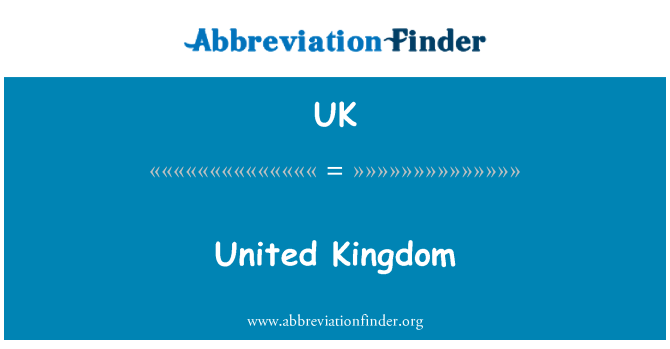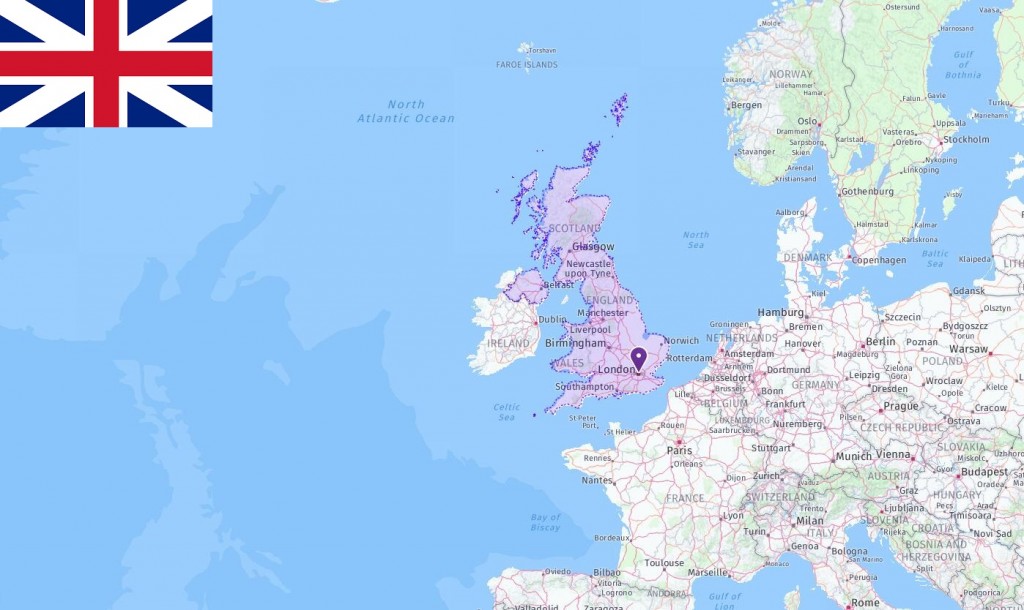UK is the abbreviation for United Kingdom, the 78th largest country in the world. Officially United Kingdom of Great Britain and Northern Ireland, United Kingdom is a country located in western Europe. London is the capital city of United Kingdom. Major cities include London (population: 7,556,889), Birmingham (population: 984,322), Liverpool (population: 864,111), Nottingham (population: 729,966), Sheffield (population: 685,357), Bristol (population: 617,269), Glasgow (population: 591,609), Leicester (population: 508,905), Edinburgh (population: 464,979), and Leeds (population: 455,112).
Country Profile
- Capital: London
- Language: English
- Area: 242,495 km2
- Population: 66,921,307
- Currency: Pound sterling (GBP)
- Time zone: UTC
- Calling code: 44
- ISO 2-Letter Abbreviation: GB
- UN 3-Letter Abbreviation: GBR
- Internet TLD: .uk
- State Government Website: gov.uk
List of United Kingdom Acronyms
The most commonly used abbreviations about United Kingdom are UK which stands for United Kingdom and GBP which means Pound sterling (United Kingdom currency). In the following table, you can see all acronyms related to United Kingdom, including abbreviations for airport, city, school, port, government, and etc.

Geography
The United Kingdom is a union of England, Wales, Northern Ireland and Scotland. Most of Wales and Scotland are highlands with valleys, lakes and narrow fjords. England and Northern Ireland consist of plains with elongated hills. The British Isles are located on the European continental shelf, with shallow waters favorable for fishing.
The climate is temperate with a lot of rainfall throughout the year. Temperatures vary little and are influenced by the warm Gulf Stream from Mexico, which flows along the west coast of the islands. It is the warmest and driest in the southeast, where the climate is affected by proximity to the continent. It is the coldest and humid climate in the north.
Air quality in several UK cities is very poor, and industrial emissions are contaminating drinking water. The authorities initiated extensive measures in the 1970s and 1980s, which have gradually improved the situation.
History
The Romans conquered the British Isles in the century BCE. Until then, the islands had been inhabited by cellars and other peoples. The Romans retreated in the 400s, and in the following centuries the islands were conquered and looted by Normans, Vikings and Saxons. Around the year 1100 the kingdoms of England and Scotland were founded. The two neighbors fought many battles until 1707, when they joined forces in a united kingdom.
Over the next centuries, the British conquered vast lands around the world and built the largest empire that has existed. The British empire ruled over a quarter of its land for a long time. Part of the reason for the success was the technological advantage the British gained through the industrial revolution of the 18th and 19th centuries.
Britain fought against Germany in both World War I and World War II. After World War II, most parts of the empire were transformed into independent states. In the post-war period, the British began to build the welfare state of the United Kingdom. The 1950s and 1960s were good years, but in the 1970s economic growth stopped. There was a political shift when Margaret Thatcher and the Conservative Party won the election in 1979. Market forces gained a lot of leeway and taxes were reduced. This eventually led to increased productivity and the halt of inflation, but also led to high unemployment and dissatisfaction among many.
Society and politics
The United Kingdom has a parliamentary form of government consisting of the House of Commons and the House of Lords. The monarch is the head of state, but it is the prime minister who has the executive power. Politics is dominated by the Labor Party (Labor) and the Conservative Party (Tory), but several small parties have seats in parliament. The United Kingdom does not have a written constitution.
In 2016, the British voted no for the country to continue to be a member of the EU. The terms of the British divorce from the EU, also called Brexit, and how the new EU-UK relationship should be, overshadows almost all other political issues.
The country has a great influence in international politics, and has long traditions for cooperation with the United States. Britain has strong ties to its former colonies. The United Kingdom also has immigrants from many former colonies, which has helped to make the country multicultural and multi-ethnic. Unemployment is low, and a strong welfare state contributes to the country having one of the highest living standards in the world.
Economics and Commerce
The United Kingdom is one of the world’s largest economies and was instrumental in founding the G7 organization, which brings together the world’s richest countries. From the industrial revolution to the post-war period, Britain was one of the world’s leading industrial nations, but in recent decades the industry has given way to financials, insurance companies, investment companies and tourism. The country has an extensive oil industry, but relies on importing oil to meet its needs.
Machines, transport equipment, chemicals, pharmaceuticals, oil/other fuels and medical and technical equipment are the main export goods to the UK. Most of the trade is done with other European countries, especially EU members such as Germany and the Netherlands. The United States is also an important trading partner.
It is expected that the British withdrawal from the EU will create challenges for the country’s economy.
UN RPGs
The UN Association is offering a game in the 2019-20 school year in which students will try to resolve a conflict in the Security Council. (Iran and the nuclear issue). The United Kingdom is a permanent member of the Security Council, and the sections that follow are information related to this game.
Foreign policy and relations with other countries in the Security Council
The UK is about to leave the EU, so the ties with other EU countries may not be as strong as before. However, European countries are still together on important issues of peace and security, and the United Kingdom is a key member of both the UN and NATO.
The United Kingdom has a close relationship with the United States, which is also a NATO member. The countries have extensive military cooperation, and the United Kingdom often participates in international operations where the United States has a leadership role. The British want the US to more fully recognize the benefits of working through international institutions such as the UN, whenever possible.
Britain’s relationship with Russia has been poor in recent years. This is both because of the Ukraine conflict and the cases involving attacks on Russian dissidents on British soil where the British believe Russian authorities are involved. The relationship with China is also not the best, but can still be described as working well. As the United Kingdom often plays with the other Western permanent members of the Security Council (US and France), the country is often in opposition to China in various polls.
Tips
The UK is one of the three major EU countries that negotiated the nuclear deal with Iran in 2015. The country still supports the agreement, but is clearly more receptive to the Americans’ version of the events of the Iran conflict than Germany and France. For example, in the summer of 2019, the United Kingdom was more willing to accept alleged evidence from the United States that Iran was behind the attacks on various tankers in the Gulf of Persia, and that the shooting of a US drone occurred in international and not Iranian waters. If the conflict escalates further militarily, the United Kingdom could be the European superpower that contributes the most rapidly to the United States militarily.
Ship traffic through Hormuz
The UK is more involved in the issue of free shipping through Hormuz than the other European powers, as Iran has seized a British ship in response to an arrest by an Iranian ship off Gibraltar. The British stopped the Iranian ship in Gibraltar because they believed it transported oil illegally to the Syrian authorities, which are subject to EU sanctions because of the civil war there. When Iran boarded a British ship in Hormuz in response, the United Kingdom called this act “a straight pirate”.
While Iran claims they are allowed to halt ship traffic in Hormuz because it protects Iranian territorial waters, and has not signed the United Nations Convention on the Law of the Sea, the United Kingdom and many other maritime nations believe that Hormuz is considered international waters. There is an old custom of free movement in this area that Iran cannot abrogate without delay.
The United Kingdom is a member of the Combined Maritime Forces naval force, which patrols parts of the Persian Gulf to prevent criminal activity at sea. The United States has proposed using this force as a starting point to create an escort for merchant ships to sail through the Strait of Hormuz. Britain was initially skeptical of this proposal because it feared that it would be drawn too heavily into the fierce confrontation with Iran that the United States wants. However, following the change of government where Boris Johnson became prime minister, the country has changed its mind and joined the US initiative.
Trading mechanisms INSTEX
The United Kingdom supports the EU’s attempt to salvage the nuclear deal through its own trade mechanism to help Iran circumvent the consequences of the harsh US sanctions on the country. This trade instrument (INSTEX – Instrument of Support of Trade Exchanges) currently contains arrangements that allow European firms to trade food and medicine with Iran without being affected by the US penalties. Iran’s message to the UK and the EU in the summer of 2019 is that INSTEX is currently completely inadequate and that oil trade must immediately be included. If the scheme does not improve, Iran will soon expand its increased enrichment of uranium, further weakening the fulfillment of the nuclear agreement.
The United Kingdom, together with the other EU countries, must consider whether they will meet Iran’s demand for oil trade to be included in INSTEX. If this happens, the UK and the other EU countries will face an even more serious collision course with the US in the Iran issue.
The United Kingdom, like the rest of the EU, is critical of Iran’s involvement in regional conflicts in the Middle East, and wants restrictions on its missile program. The country also supports the sanctions imposed by the EU against Iran as a result of cases involving the authorities’ alleged co-responsibility for assault plans against Iranian dissidents living in Europe.
Nuclear weapons-free zone
When it comes to the proposal to create a nuclear-free zone in the Middle East, the UK was one of the co-authors when it was promoted as part of the agreement to extend the Non-Proliferation Agreement indefinitely in 1995. The country still supports the proposal, but will not insist that this must happen now and against the will of Israel. The United Kingdom can support regional talks in the first place to increase trust between countries in the region on security and peace issues.
The United Kingdom is also one of the “old” nuclear weapons states that developed their weapons before the Non-Proliferation Treaty came into force in 1970. It is estimated that the country today has approx. 215 nuclear warheads in his arsenal.
Britain believes, like the other great powers, that nuclear weapons are important to keep in an uncertain world. Politicians in the country are positive about the goal of eliminating nuclear weapons in the long run, but believe the goal is not achievable right away. They see no contradiction between talking about nuclear disarmament politically, while at the same time modernizing the nuclear weapons one already has. The UK must be prepared to be criticized for not disarming more actively, as the Non-Proliferation Treaty actually imposes on nuclear weapons states.
View this article in other languages:
Deutsch – Français – 繁體中文


